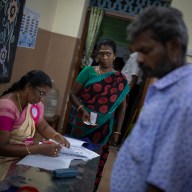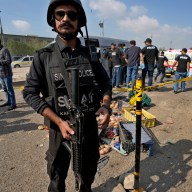OTTAWA – “Clear and convincing evidence of fraud” in the Afghan election could seriously damage already fragile public support for the war in Western countries, a U.S. expert said Tuesday.
A United Nations-backed commission in Kabul has ordered a recount of the Aug. 20 results, which gave President Hamid Karzai 54 per cent of the decided ballot.
Allegations of ballot-box stuffing, questionable tallies and other voting problems could be a watershed moment for the war-weary public in the U.S., Canada, Britain and other Western nations with troops fighting in Afghanistan, said Thomas Johnson, a professor at the Naval Postgraduate School in Monterey, Calif.
“It’s going to have a major impact on how the population views Afghanistan,” Johnson said in an interview.
“I think this is very damning because it just highlights the complexities and the types of problems we’re facing.”
Grant Kippen, the Canadian chair of the UN-backed Electoral Complaints Commission, said Tuesday the agency had identified questionable results in three provinces: Ghazni, Paktika and Kandahar, where 2,850 Canadian troops have been fighting.
A tarnished election result could lead many Western nations to question more forcefully why they’re sending their sons and daughters to fight and die for an allegedly corrupt regime, Kippen said.
Canadians have been skeptical almost from the outset about the deployment to Kandahar, but support in both the U.S. and Britain nose-dived this summer as the number of combat deaths hit record numbers.
Public and political expectations of what could be achieved in Afghanistan and how long it would take were total “folly,”Johnson said.
“I think many people in the West just naively believe you can paint a coat of democracy over Afghanistan. The hard realities hit home when they see elections such as this.”
In launching the so-called war on terror, Johnson said, the George W. Bush administration set about to create secularized, Western-style democracies in both Afghanistan and Iraq. But it did not take into account that neither country had a tradition of such institutions, and did not properly consider how long it would take and how much it would cost.
“It took hundreds of years for all of the complicated aspects of democracy to take place in the United States, but we expect this to happen overnight in Afghanistan. And that’s just delusional thinking.”
Some scholars have argued that pushing democracy too fast in societies that lack certain infrastructure and capabilities can hinder the process.
“I think in many respects that’s what’s happened,” Johnson said.
“I think the Bush administration tried to push democracy too quickly onto the Afghans. Not that it’s not going to take place in a generation down the road, but to think that we could put this all in place overnight was just delusional thinking.”
Political insiders in Ottawa said Prime Minister Stephen Harper realized soon after coming to office that Bush “really meant it” when he said he was committed to staying in both war-torn countries as long as it took to achieve Jeffersonian-style democracy.
That strengthened the government’s determination to extract Canada from its Afghan combat mission in 2011, a high-placed source said.
Lewis MacKenzie, a retired Canadian general, said he doesn’t believe a tainted election result will lead soldiers to question the mission or make them less willing to fight because they’ll be too preoccupied doing the job.
The bigger fear is whether supporters of Karzai’s main rival, Abdullah Abdullah, accept the result – or if they attempt to sow further chaos, he said.
More than 650 major fraud charges have previously been lodged with the Independent Electoral Commission, which said results from 447 polling stations had been thrown out.
Johnson said no one should be surprised since this election was organized and executed by the Afghans without the direct support of the international community.
Western countries knew there weren’t enough international observers at rural polling stations and they should have challenged Karzai’s government’s plan to open ballots and do a preliminary count before re-sealing them and shipping them to Kabul for the official results, he said.
Douglas Bland, chair of defence management studies at Queen’s University, also said the shaky results aren’t surprising, but added counter-insurgency experts have begun to wonder how much of the confusion and corruption legitimately belongs on Karzai’s doorstep and how much was induced by the Taliban.
“They vowed to disrupt the election and anyone who knows counter-insurgency warfare realizes that stuffing ballot boxes and dropping them off at polling stations would be a great way to discredit the process,” he said.
“I think a partial democratic election is better than no democratic election.”
















